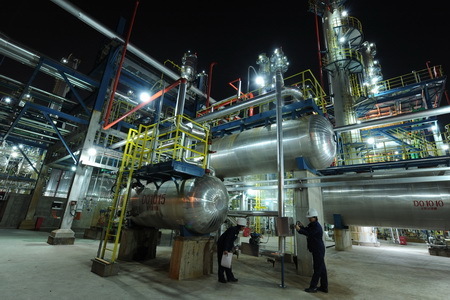China's 1st refining, petrochemical JV launches
|
|
|
Quanzhou facility to mainly process Saudi Arabian crude. [China Daily] |
China Petroleum and Chemical Corp., known as Sinopec, on Wednesday put into commercial operation the country's first Sino-foreign joint venture combining refining and petrochemical operations.
The facility, located in Quanzhou in the southeast China's Fujian Province, will triple Fujian's annual oil refining capacity to 12 million tonnes from 4 million tonnes.
The upgraded refinery primarily refines and processes sour Arabian crude.
The complex also includes an 800,000-tonne-per-year ethylene cracking facility, an 800,000-tonne-per-year polyethylene unit, a 400,000-tonne-per-year polypropylene unit and a 700,000-ton-per-year paraxylene/aromatic hydrocarbon unit.
Its sales revenue is estimated to exceed 60 billion yuan (US$8.8 billion) per year.
Fujian Petrochemical Co., a 50-50 joint venture between Sinopec and Fujian provincial government, holds 50 percent stake in the US$4.9-billion plant. Exxon Mobil and Saudi Aramco hold 25 percent stake each.
The three oil giants also have a marketing joint venture, which runs about 750 petrol stations in Fujian.
Su Shulin, Sinopec's chairman, said the full commercial operation of the project will meet the ever growing demand for petroleum and petrochemical products.
"Sinopec adheres to the principle of complementary advantages, long-term partnership and mutual benefits, and is actively seeking opportunities to cooperate with multi-national companies," he said in a press release.
Lin Boqiang, head of the Center of China Energy Economics Research, Xiamen University, said the project is an example of China's "bring in oil companies from oil-rich regions" strategy.
The project, with participation of foreign oil giants, could help China secure oil supply, Lin said.
Contrary to buying foreign oil assets, the strategy is less risky and more stable in offering benefits, the expert said.
Meanwhile, the oil exporters could reduce their reliance on developed western countries by cashing in on the huge market in China, Lin told Xinhua.
"It's a rather wise choice to encourage oil-rich countries to make more investments in China," Lin said.
The investment opportunities are believed to be plentiful as China planned to build nine large refining bases in the coastal regions in the next three years to process oil shipments for energy security.
It is reported that three bases, Shanghai, Ningbo and Nanjing, will have an annual refining capacity of over 30 million tonnes each. The other six, which also include Tianjin and Guangzhou, will each have an annual capacity of over 20 million tonnes.
 0 Comments
0 Comments







